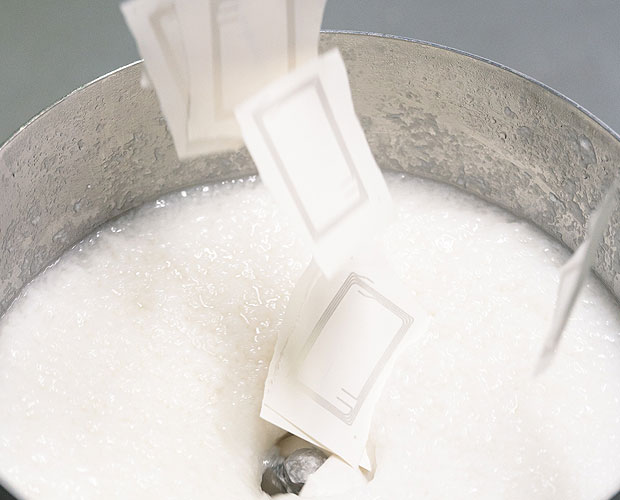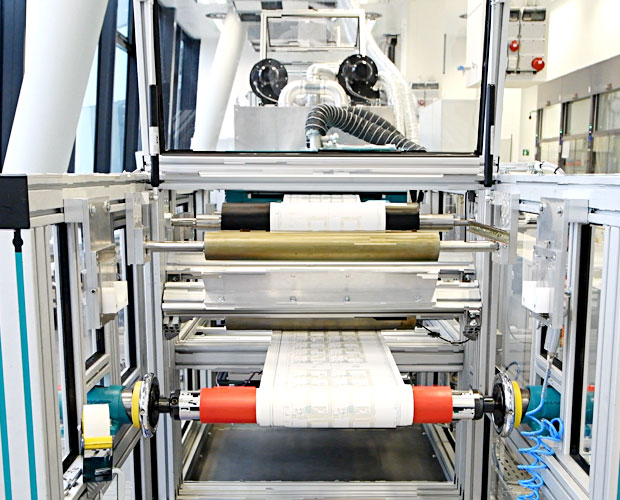CircEl‐Paper: Recyclable paper‐based electronics


Millions of tons of electronic waste are produced in the EU every year. With a novel approach, the new EU project "CircEl-Paper" could sustainably improve the recycling process for electronics in the future.
Electronics that can be disposed of and even recycled using conventional paper recycling process? That is the goal of the EU project CircEl-Paper. For this purpose, the project is looking at the development of functional printed circuit boards based on paper technology. Such an approach, which enables a sustainable circular economy for electronics as well, has raised interest of researchers since a few years and has not yet been investigated for complex devices and within a large complementary consortium. If the entire life cycle of a printed circuit board is taken into account, the impact of the project can be enormous. Recycling in general is already well established in the EU, especially in the field of paper recycling.
However, there are still significant deficits when recycling e-waste: of 12 million tons of e-waste produced in Europe, only 42 percent has been properly collected and recycled, as reported, among others, in the reports of the World Economic Forum. Globally, 53 million tons were produced, only about 17 percent of waste was verifiably collected and properly disposed of, according to the Global E-Waste Monitor 2020[1]. And even when e-waste ends up in the recycling process, there is another issue: electronic printed circuit boards (PCBs) are mounted in almost all electronic products, containing sensors, chips, capacitors, resistors and more. These PCBs are made of a glass-fiberpolymer, copper-based circuitry, and various metals.
Because there are so many different materials in printed circuit boards, full recycling is very complex and expensive. The recycling process best accepted by consumers is that of waste paper. It is also one of the most proven recycling processes. Therefore, to increase the recycling rate of electronic components, the paper recycling route is the most promising. The aim of the CircEl-Paper project is to find out whether and how this is possible without sacrificing the performance of the electronics.
An important step on the way to recyclable printed circuit boards is the replacement of the standard FR4 glass-fiber-polymer composite material with a paper substrate. For the ecological footprint, this would mean a reduction of up to 60 percent in CO2 equivalents. In an EU project completed two years ago, papers, printing processes and various functional materials were identified that were suitable for the production of printed sensor technology on paper substrates. CircEl-Paper goes a major step further here, both in terms of possible applications and in terms of examining the process as a whole. In order to transfer printed circuit board technology to the circular economy, each process step is examined. In addition, alternative approaches are being developed to increase the proportion of materials that are recyclable, bio-based, based on secondary raw materials, or at least harmless to the environment.
The CircEl-Paper project team will demonstrate the diverse areas in which paper-based PCB technology can be applied with three use cases from the fields of medicine, logistics and consumer electronics: A medical sensor for measuring glucose levels on the skin, packaging with an integrated time-temperature indicator (TTI) or greeting cards that play music exemplify the technology's performance and adaptability.
The international consortium that has been working on the project since September 2022 covers the entire value chain. A number of well-known research institutions, academic partners and production companies are involved: the Fraunhofer Institute for Silicate Research as project coordinator, Joanneum Research GmbH in Austria, the RISE Research Institute of Sweden, the Italo-French paper manufacturer Fedrigoni, the French ink manufacturer VFP ink Technologies, the printed circuit board manufacturer Malmö Mönsterkort in Sweden, and Grenoble INP, Graduate schools of Engineering and Management, University Grenoble Alpes.
[1] Global e-waste monitor, published 2020, https://www.itu.int/en/ITU-D/Environment/Pages/Spotlight/Global-Ewaste-Monitor-2020.aspx
Last modified: